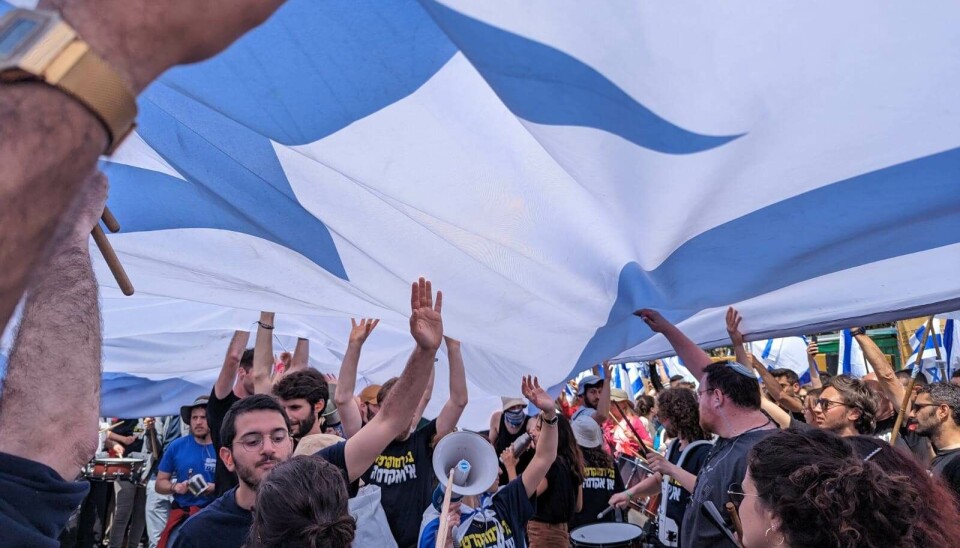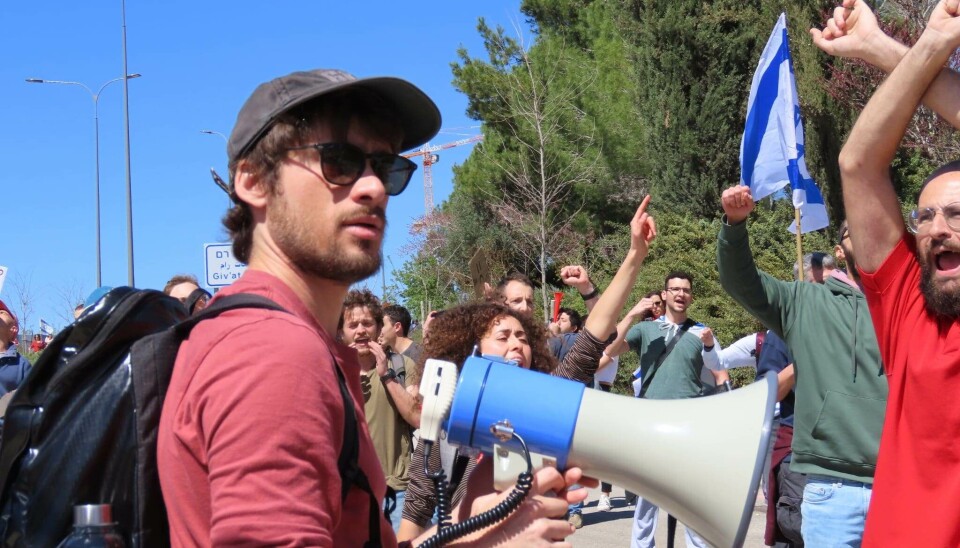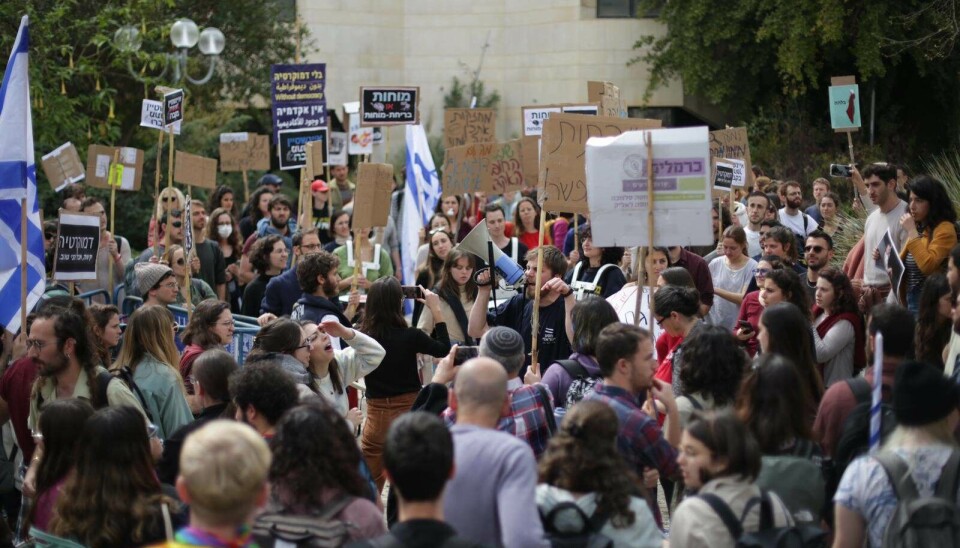INTERVIEW PROTESTS IN ISRAEL
‘What Israel needs right now is CPR’

Following the unprecedented protests in Israel in recent weeks, Veto sat down with Thomas Aboucaya, an Israeli student who has been partaking in the protests. The circumstances are urgent and dangerous. Now, tensions are not only between Israeli and Palestinians, the Israelis themselves are more divided than ever before. Importantly, Thomas is highly aware of the extent to which Israel - the country he grew up in - is dangerously changing.
The protests Thomas has taken part in are against the Netanyahu government’s attempted judicial reforms. These reforms are part of a right-wing slide taking place in Israeli politics. The current government, with extremist factions, was formed in November 2022 after years of elections and chaos - Netanyahu has been on trial for corruption since 2016.
In January 2023, the government attempted to change, and weaken, the power of the Supreme Court, removing their ability to overrule the decisions made by the government. Suggestions put forward included allowing a simple majority of 61 in the 120-seat Knesset the power to override Supreme Court rulings, and for Israeli politicians to have the power to appoint justices to the bench. As of April 11th, 2023, Netanyahu seems entrenched with his plans, having rejected calls from other world leaders to change his acts and violence between Palestinians and Jews continued at holy sites around Easter time.
Since the entry of the extreme-right, radical Zionist coalition government of Israel in December 2022, many citizens gather weekly to object to plans put forward by their government. Images of thousands of protesters wearing red robes from the Handmaid's Tale, holding LGBTQ+ flags or 'Save the democracy' signs have spread across the world. So, how come so many Israeli citizens have decided they must go and protest?
Thomas: (Laughs) 'Well, there are a lot of issues in Israeli politics. Indeed, this is not breaking news to anyone! However, what motivated all these Israelis to take the streets now is mainly the judicial reforms that the new government wants to pass. With these, they move far past the “red line”. The judicial reforms would basically draw back any mechanism that protects minority rights in Israel. If it does pass like it is drafted now, it will most probably, bit by bit, cancel Israeli democracy.'
'And I believe that is why so many people realise that we need to stand against these acts and protest. If we cannot stand up when something is threatening our democracy, the cornerstone to tackle all other issues, like Palestintian occupation, would be lost. Importantly, many external people do not understand that the only mechanism that gives Israelis control of their government is the Supreme Court and the judicial system; we do not have a constitution or second legislative chamber.'
'Worryingly, nuance has disappeared'
'Israel is very divided and polarised; you're right or left, secular or religious, against Netanyahu or with Netanyahu. It's come so far that some see Netanyahu as a King! Worryingly, nuance has disappeared. Two weeks ago, there was a marathon in Jerusalem and myself and others protested against the government. We received a lot of comments from passing people. Roughly half the comments were, “Way to go, we are with you”, but the other half of them were against us, but not for nuanced reasons, rather it was “Benjamin Netanyahu is king.” This lack of nuance is alarming. And so with these protests, I think people are finally waking up to the danger of accepting simplistic narratives and the seemingly increasing total power of the government.’
You recently returned to Jerusalem after your Erasmus exchange. Did you immediately know that you would participate in the protests?
'For me, there was no way that I would not get involved - democracy is at stake. Therefore, I immediately knew I wanted to help and do something about it. Even though I myself am privileged - I am a white male with a French passport and so the reform would not right away destroy my life - it would profoundly affect so many others and Israel’s future. Therefore, it was important to me that I became involved.'
What is your role now in the protests? Do you go often?
'I decided to join the student protests in Jerusalem as this group was where I felt the most comfortable. So far, I have helped to organise events and interact with people at protests. For example, we have regularly spoken with people in the streets, talking about the protests and crucially exchanging different viewpoints.'

'The main protests you see on your news media take place every Saturday, mainly in Tel Aviv. During the Saturday day of protest, we disrupt the normal events of the day by blocking roads. The goal is to inhibit everyday life so the government has to address the reasons for our discontent.'
'A key moment came when the Ministry of Defence publicly opposed the reform on March 26th, saying that the reforms should stop until discussions can happen and a consensus could be reached. Minister Yoav Galant went against it, then he was fired the next day by Netanyahu. This was a red line, and there were spontaneous bursts of protests all over the country. (As of April 10th, 2023, Netanyahu has reversed the decision to fire minister Yoav Galant, red.) Following this, Netanyahu declared that he's postponing the judicial reform, and we reached the current situation we are now in.'
'Occupation is misunderstood in relation to the protests'
'However, it's not a victory yet, because one of the conditions for this pause lay in giving a promise to one the minister of National Security, Itamar Ben-Gvir - who is very, very extremist - that he could create an armed force under his control for matters of defense. It means the creation of a private militia: a big no in a democratic society!'
'So now it's back to undertaking action once in a while, with the major protests once a week on a Saturday night to ensure we are not compromising on a millimetre of our democracy.’
What are the demographics of protestors - would you say it is overwhelmingly left-wing and young?
‘The majority of protesters I have seen and interacted with are Ashkenazi Jews: the protestors are not fully representative of all Israelis. The majority is from good economic backgrounds; wealthy families that also might hold prestigious positions in the military or positions in the media. Not every one of them of course, I do not want to generalise. However, this is one of the problems for these protests. We are seeing the protests being painted as the fight of the privileged, elite Ashkenazi Israelis, “with the Rolexes”, against the more traditional, conservative, Sephardic Jews.'
'Additionally, in the beginning of the protests, the majority of those involved were from the cultural, liberal, left wing of Israel, those from Tel Aviv; where it almost feels like a different country! However, I do know some settlers in the occupied territories that are against the reforms which is important to share; the situation is not “black and white".
I also feel like a lot of the mature adults that have been living in Israel a long time are feeling like the country they grew up in, with all its problems, is worryingly shifting too right-wing. I think older adults see that the foundations are crumbling; being taken away from us.'
'The protests have focused on the planned judicial reforms and their potential to damage Israel’s democracy. Do you think the issues of Israeli occupation of Palestinian land and the ongoing violence with Palestine should also be addressed? As Joshua Leifer states for The Guardian: ‘That the protesters are chanting “democracy” reflects…their blindness…because they misrecognise Israel as democracy when it is, in fact, a liberal ethnocracy that has maintained a military dictatorship in the West Bank for more than half a century.’
‘It is of course a very difficult situation that we must talk more about in Israel. My political opinion is left wing and I'm against occupation, and so I do not agree with the continued violence against the Palestinians and increasing Israeli settlements. I think occupation is one of the biggest problems, if not the biggest problem, in Israel, both practically and morally. A lot of people who are against this reform are against occupation as well - from what I have seen. However, I think we need to separate the two issues. Let me explain why with a metaphor.'
'I feel now we have a patient that is bleeding on the table. For a long time, we have known that we must do an operation to save his life in the future. This would be sorting out Israeli occupation of Palestinian land. But what the patient needs right now is CPR; we need to do CPR in order to get the patient to the hospital and fix his bleeding. If we don't give him CPR, he won’t survive his injury, and then no operation would ever take place.'
'So, if we don't have at least a basic level of democracy, and I agree that our democracy is flawed from the get go as an occupying force of the Palestinians, then we can’t fix deeper issues. If we see democracy as a spectrum, Israel is some kind of flawed democracy now, but this would be lost through these reforms and further harmful changes it would facilitate. If these reforms pass, every little step forward towards peace with Palestine would be lost, and we would be moving away from solving occupation.'

'Unfortunately, we also need those supporting occupation on the side fighting against Netanyahu’s reforms. So if the protests against the reform brings in the occupation as a dual message, it can push away a lot of people with complex or undecided thoughts about occupation, but are totally for democracy and against backsliding. We need all the people that we can get now.'
'It is motivating to see what happens when people unite and raise their voices to the government'
'Interestingly, foreign media outlets have continued to address occupation in coverage of the protests. I think people should talk about occupation, it's not that it's not important to keep addressing this, but it's misunderstood in relation to the protests. People need to understand that we're dealing with a monumental challenge to the structure of Israeli democracy, and we have to address this first. If we are not primarily talking about occupation, it is not that we are not interested, or care deeply about this, but it's that right now, it is a different step detached from the current fight.'
What do you think and hope will happen next in Israel?
'Personally, I don’t agree with the apocalypse scenario that people are talking about. This entails the Supreme Court doesn't accept the reform and says it's undemocratic and then we enter a constitutional crisis, as the military forces and the police for example start to question who they should listen to as the autority.'
'I hope that we're going to keep protesting as long as the reform is on the table, and reach a suitable outcome that has listened to the people, and a situation whereby the respect for government is maintained. Right now, it is motivating to see what happens when people unite and raise their voices to the government. We should not forget the power of the people, especially in this troubled world where many democracies are seeing issues.'
This interview expresses the opinions and personal experiences of Thomas Aboucaya only, and is not representative of other Israelis.









